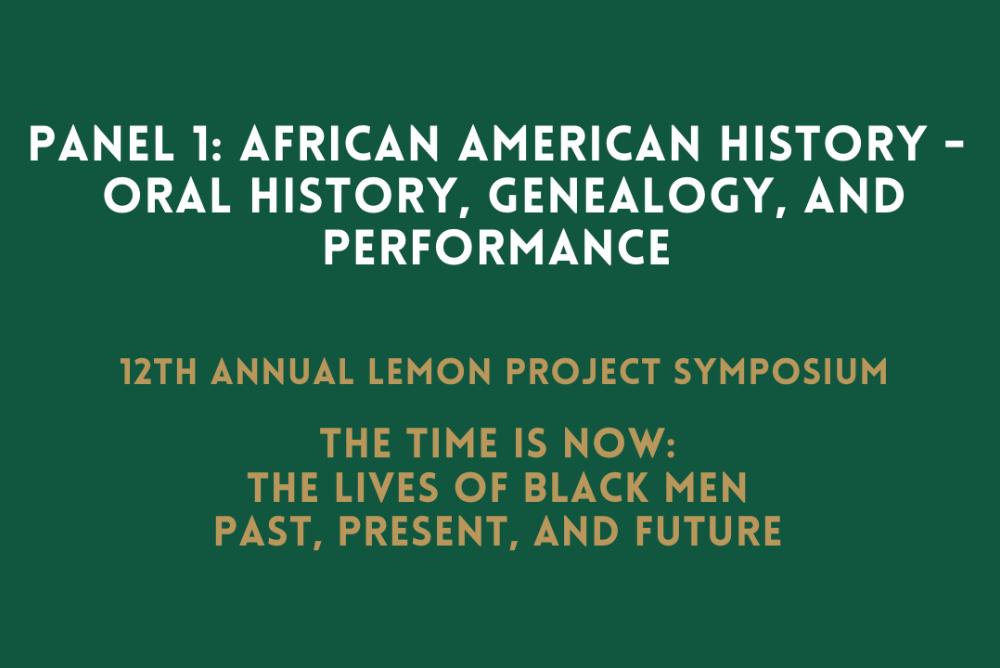Diversity & Inclusion Events
[PAST EVENT] Lemon Project Symposium: African American History - Oral history, Genealogy, and Performance
Location
School of Education, In person at Holly Room and Virtual over Zoom301 Monticello Ave
Williamsburg, VA 23185Map this location
Access & Features
- Free food
- Open to the public
- Registration/RSVP

Panel 1: African American History - Oral history, Genealogy, and Performance
12th Annual Lemon Project Spring Symposium
To join us in person, register here.
To join us virtually, register here.
Moderator: Dre Taylor, Special Collections Research Center, William & Mary
Diane Brown Townes, (She, Her, Hers) Descendant Community Lecturer/Educator, Dr. Eugene Dickerson's Call to Action
This proposal will explore a letter written by Dr. Eugene Dickerson to Dr. W. E. B. Dubois on April 28, 1924. It will allow symposium participants to draw a comparison to the early 20th. Century “Lost Cause Progressive Movement," a historical interpretation that minimizes the horrors of slavery and upholds white supremacy. To today's normalization of violence through the white evangelical "progressive" movement. Dr. Eugene Dickerson was my father's cousin. He was born on August 1, 1877. As I take this opportunity to learn more about his work as a Delegate to the Virginia State Republican Convention at Roanoke in 1920. As a community healer, how was Dr. Dickerson able to overcome the economic envy that was often exemplified by acts of white mob violence during his time? As I research ways to repair and redress the impact of the Trans-Atlantic Slave Trade, I have frequently been asked this question of late: What Do African Americans Want?
Carol Miller and Burnell K. Irby, Community Members, The Continuing Saga of Cecil Alonzo Smith
This is a story of migration. We will introduce Cecil Alonzo Smith. Cecil was born in York County, raised in James City County and attended school in Williamsburg. After completing his education in Virginia Cecil’s desire to write and perform would take him to New York. We will share some of the experiences that helped inspire his journey from a small area in Virginia known as Grove to Brooklyn. After his move to New York, Cecil established a community theater group called “The Alonzo Players”. He called upon his childhood memories from Grove to help create what he described as “the world’s first live continuing saga in soap”, “Beulah Johnson”. As a child Cecil experienced the trauma of having his family home and the entire community into which he had been born taken. His early years were spent seeing, and enduring, the struggles of the community as it began to rebuild in a new location. Cecil did see his community reborn. The sadness of the loss would lessen and the joy would return giving birth to the stories he would later tell. Cecil took Grove with him and in his own way told their stories with humor and imagination. Along with his writing credits, “The Alonzo Players” are Cecil’s most enduring legacy. Cecil saw the world through many lenses…a Black man of the segregated south, a gay man in the 1960s to the 1990s, and a man with a desire to create and perform. This presentation is to celebrate the life of a son of Williamsburg, Cecil Alonzo.
Latika Johnson Lee, Community Historian, Case Study: Robert H. Gaines, A Genealogical Gem
Utilizing the case study of Robert H. Gaines, this presentation will illustrate research methods and resources to complement oral history interviews and family records that document the perseverance and resilience of this behind-the-scenes butler and his service to Josepheus Daniels, former Secretary of the United States Navy in 1919. Raised in southeast Georgia just after the Civil War, Gaines migrated North to escape oppression and seek better social, educational, and economic opportunities. Despite prejudiced “Jim Crow” laws and racial discrimination, he progressed to be a model citizen representing his race, where he served foreign dignitaries and heads of state for more than three decades. The session will trace the dramatic changes that swept American society during this time from reconstruction to World War I and beyond, and how those changes affected this man's life and family.
Derrick Jones, Negro League historian and collector, African American men and Democracy
In this presentation, I seek to unpack the ways that Democracy looked like and felt like for four noteworthy individuals associated directly and or indirectly with Negro Baseball Organization. It is my goal to highlight the notion that each pair of individuals’ brushes with democracy were significantly different. I will use very rational reasoning from explicit examples from research to illustrate the differences. However, examples of mutual respect were developed and established amongst these individuals. These African Americans actually served as saviors for our American democracy. And as an African American in America, played an instrumental role in getting along with white people. Those relationships may have helped nudged America’s democracy just a wee bit. They were exemplary examples of how to behave when social equality was not in their favor. This is an attempt to stem a distinctive vision for the present and future generations to learn from.
Contact
[[setho2, Sarah Thomas]]
